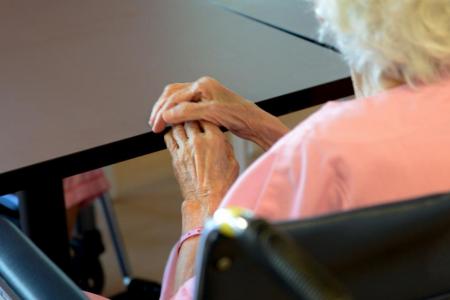3 in 4 people with dementia feel ashamed and rejected, says study
Half of them cite stigma as the main reason and feel other people treat them as less competent, survey shows
He was in secondary school when his grandmother, then 83, started showing signs of dementia.
As her condition worsened, her frustration led to anger and violence, and she would lash out when approached or touched by anyone, including her family.
The 25-year-old consultant, who declined to be named, said that when his grandmother forgot their names or something else, she would be ashamed and apologise.
Eventually, his grandmother started forgetting who her family members were before she died at the age of 93 in 2017, he told The New Paper yesterday.
There are thousands of dementia sufferers like her in Singapore, and their numbers will rise in tandem with the ageing population.
Many sufferers are also ashamed of their condition.
The findings of the first national survey on dementia, released yesterday, show that three in four persons with dementia feel ashamed, lonely and rejected. One in two cited stigma as the main reason for their shame.
About half also said they could not be open about their condition with other people and felt that others treat them as less competent.
The study, conducted by the Singapore Management University (SMU) and Alzheimer's Disease Association (ADA), polled more than 5,600 people, comprising 32 dementia patients, 1,156 caregivers and 4,491 persons not related to dementia patients.
Nearly 30 per cent of caregivers said they felt embarrassed while caring for loved ones with dementia in public.
About 56 per cent of the public rate themselves low in knowledge about dementia, and more than 54 per cent feel uncomfortable interacting with persons with dementia.
But almost four in five of all respondents want to do more to improve the lives of those with dementia.
Unsurprisingly, those with no connection to dementia, with men significantly more than women, have the highest levels of bias against it, ADA said.
UMBRELLA TERM
The ADA website describes dementia as an umbrella term that covers a wide range of symptoms including memory loss and mental decline.
Alzheimer's disease is the most common form of dementia.
One in 10 people above the age of 60 and one in two above 85 in Singapore has dementia, says a study by the Institute of Mental Health (IMH).
This translates to an estimated 82,000 cases in 2018. The number is expected to rise beyond 100,000 by 2030.
ADA spokesman Jeremy Khoo told TNP that the results of the survey are worrying.
He said: "While it is not surprising that those who don't have any knowledge of or contact with dementia may have high levels of stigma against it, it is surprising and worrying that even those with dementia are stigmatised against the condition.
"When they feel the condition is shameful or that the disease is highly stigmatised, they are unlikely to reach out for help or seek support."
Ms Rosie Ching, Senior Lecturer of Statistics in SMU's School of Economics, added: "Those with dementia have the second highest level of stigma against themselves, which must say a lot about how they feel living in a society like ours.
"Although Singapore has come quite a way since (the 1990s when her great-grandmother suffered from the condition), it is still very important to discuss dementia because it is getting to be a national threat to society's well-being."
Mr Sean Ng Wei Xian, 23, a first-year undergraduate who worked on the survey, hoped it would highlight a topic that might otherwise not be talked about regularly in Singapore.
Relating his grandaunt's struggles with Alzheimer's, he told TNP: "If there's a lack of awareness and understanding of dementia, many people will not be prepared to accept the condition or face up to it."
ADA chief executive Jason Foo said: "We need to strive towards changing the mindset of society and break stereotypes.
"We can look at what we do and explore ways to see how we can include persons with dementia in our everyday life and reduce the stigma."
Raising dementia awareness can help patients, caregivers
The Alzheimer's Disease Association (ADA) will be launching a nationwide dementia awareness campaign in June, starting with a set of dementia-language guidelines followed by roadshows, events, talks, videos and culminating in a public event on World Alzheimer's Day on Sept 21.
ADA chief executive Jason Foo said: "ADA believes that proactive steps should be taken to educate people to be aware of dementia, be mindful of any preconceived thoughts of dementia as a debilitating condition.
"In building inclusive dementia-friendly communities - anyone and any organisation can be part of this movement."
The first national survey on dementia, released yesterday, found more than half of its 5,600 respondents knew little about the condition and over 40 per cent were frustrated about not knowing how to help.
The study by Singapore Management University (SMU) and ADA also showed that many people with no connection to dementia, especially men, have a negative attitude regarding the condition.
This clearly shows the need for greater dementia awareness, said experts.
Stressing the need to change the mindset of society and break stereotypes, Mr Foo said: "All of us should not focus on their (people with dementia) deficits, but on what they can still do with their remaining abilities.
"It is important to recognise that they can still lead purposeful and meaningful lives."
If your loved ones tend to forget events and instructions, repeat questions or conversations, or show reduced ability in doing familiar tasks, they might have dementia.
It is important to get tested for dementia, as regular medication and treatment programmes can help delay the decline.
ADA spokesman Jeremy Khoo said it is important for dementia patients to remain active and continue with their everyday tasks and interests.
He added: "For example, we organise art and dementia programmes, where people with dementia can keep mentally active and continue to do the things that they can do, such as arts and craft, and not focus on the things they cannot do."
He said that such activities jog their memory and can help to delay the decline.
With increased awareness and reduced stigma, patients and caregivers will find it easier to reach out and seek support from their communities, reducing the stress and isolation felt by them, he added.
Dementia patients or their families can seek help and information from ADA's website, as well as the Health Promotion Board's online resources.
If you or anyone you know have dementia, you can call the ADA's hotline at 6377-0700.
Get The New Paper on your phone with the free TNP app. Download from the Apple App Store or Google Play Store now



